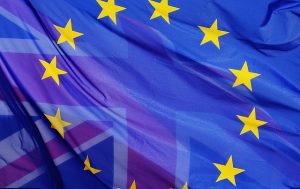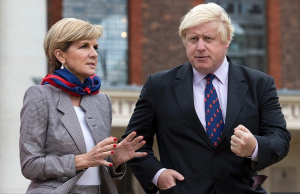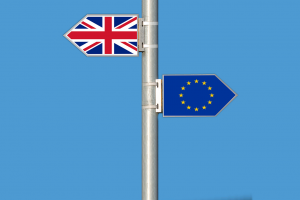Potential Economic Implications for British Citizens, based on Post-Brexit EU Immigration Policy

Last Friday, Australian Foreign Minister Julie Bishop and the UK’s most famous Brexit advocate (and now UK Foreign Secretary) Boris Johnson, met to discuss the implications of Australians both working in the UK, and subsequently any future effects for Australians and UK citizens within the EU zone.

Julie Bishop called the meeting to discuss bilateral agreements post-Brexit, as significantly, Australian citizens on working visas in the UK have dramatically decreased by a staggering 40% within the past 10 years. Is this why Australia and Britain are negotiating a free-trade deal?
Although Mr Johnston stated that he wants to “increase immigration” between the two Commonwealth members with a potential ‘free-trade deal’ being discussed, the problem will lie in other member states in the EU inadvertently wanting the same immigration conditions for ‘free movement of their citizens’ and working rights of their citizens within the UK. Ironically, one of the main reasons UK citizens voted to leave the EU was for a crack-down on their immigration policies.
As has been proposed for Britain post-Brexit vote, although a country may not be an actual member of the EU, certain non-members in the region who want liberalised financial benefits from the region can actually choose to be included in the EEA (European Economic Area). Although debatable, countries in the EU and/or European Economic Area enjoy many benefits between its members such as removed trade tariffs, quotas, and visa-free border crossings, that would normally be heavily implemented without such a treaty.
If the non-binding Brexit goes ahead by impeding the ‘free movement of persons’ by imposing even tougher restrictions on free movement of EU citizens within British policy, this could potentially be one of the main reasons for any future economic exclusion of Britain from the EEC (European Economic Community). This is because member states must vote in a majority against them based on their compliance to TEU Article 2 – Principles of the EU. Any exclusion from the EEA could lead to severe economic ruin for Britain, such as sanctions (if still a member of the EU) under TEU Article 7 and/or exclusion from any ‘single market economy’.
For inclusion to this ‘single market economy’ of the EEA (whether on not they are an EU member or not), the nation state must still adhere to the laws of the EU by complying with the Copenhagen Criteria. The Copenhagen Criteria is a treaty relaying the set of values and principles (Exclusive, Shared and Supporting Competencies) comprising of primarily four fundamental ‘free-movement policies’ that EU Member states must agree and adhere to.
In summary, the Copenhagen Criteria is for the free movement of Goods, Services, Capital and People’ within the European Economic Zone.

Generally, other countries who are not considered a part of the EU, but who are within the Schengen zone and are compliant with the EU policy are countries such as Norway, Iceland, Liechtenstein and Switzerland (EFTA Member). Though not direct members (they have heightened economic and border controls), primarily they are still considered to be a part of the ‘single market’ in the ’European Economic Area’ (EEA) through a series of bi-lateral agreements, compliance and by paying funds into the EEA Grants Scheme.
Knowing that Britain’s removal from the EU has been decided through the democratic referendum process, it must also be known that the Brexit is not actually a legally binding agreement. This can possibly assist the UK, as there is no actual legal time limit attached to the withdrawal and they can actually review their decision and any subsequent ramifications. To be removed, Britain must trigger Article 50, of the Lisbon Treaty, 2009 which recognises the exit of a member state from the European community by not being able to meet their own domestic “constitutional requirements”. Unlike Australia with their domestic legislation taking precedent over any international laws or treaties (also including Australia’s ’highly questionable’ immigration policy), it is noted by us as Registered Migration Agents at Alliance Migration who are specifically trained in immigration law, that the instatement of Article 50 is complete unchartered territory. It can also be attested that EU treaties and law in some member-states seem to hold supremacy over many national court systems.

Greece was almost excluded from the EU in 2015 amidst economic collapse, where in after a series of ‘bail-outs’, were forced by the EU to sell a majority of state-owned assets and be subject to extreme austerity measures. Turkey, on the other hand has been desperately trying to negotiate accession into full EEC membership since 2005.
Due in-part to mass migration of asylum seekers from countries such as Syria and Iraq, and the wanting of the reinstatement of national sovereignty, large scale debates are happening across Europe in places such as Sweden and Denmark also proposing their removal from the EU, and/or the changing of their migration policies.
The implications of changing any domestic immigration policy by a member state by excluding the ‘free movement of persons’ could potentially force a state also in being removed from European Economic Community itself, (which must be a unanimous decision from other members), or be sanctioned under a majority ruling under TEU Article 7. A major conundrum lies if a large number of member states are also considering the tightening their border controls, or also exiting the EU.
Let’s look projectively (in worse-case scenario), though this is an untested hypothesis, if a majority of EU members change their national immigration policies (by not meeting TEU Article 2 – Principles of the EU), and by not complying with free movement policies, could the outcome for the European Community be-in-fact subject to heavy reforms, complete abolishment or actually implode-on-itself (Armageddon style)? Herein lies the question.
Though I do not know the answer, I do know that Europe is about to get a whole lot more interesting.
Kate White – Alliance Migration
Mara No. 1683994
BComm Grad AustImmiLaw
